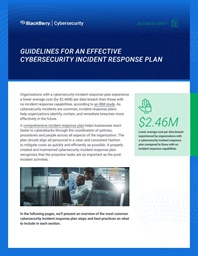Guidelines for an Effective Cybersecurity Incident Response Plan
Organizations with a cybersecurity incident response plan experience a lower average cost (by $2.46M) per data breach than those with no incident response capabilities, according to an IBM study. As cybersecurity incidents are common, incident response plans help organizations identify, contain, and remediate breaches more effectively in the future. A comprehensive incident response plan helps businesses react faster to cyberattacks through the coordination of policies, procedures and people across all aspects of the organization. The plan should align all personnel in a clear and consistent fashion to mitigate costs as quickly and efficiently as possible. A properly created and maintained cybersecurity incident response plan recognizes that the proactive tasks are as important as the postincident activities. In the following pages, we'll present an overview of the most common cybersecurity incident response plan steps and best practices on what to include in each section.
Read More
By submitting this form you agree to BlackBerry contacting you with marketing-related emails or by telephone. You may unsubscribe at any time. BlackBerry web sites and communications are subject to their Privacy Notice.
By requesting this resource you agree to our terms of use. All data is protected by our Privacy Notice. If you have any further questions please email dataprotection@techpublishhub.com
Related Categories: Encryption, Endpoint Management, Incident Response


More resources from BlackBerry

BlackBerry Cyber Suite
The challenge of securing and protecting data and endpoints is not a new requirement, but today it is more important than ever. With a rapidly expa...

Guidelines for an Effective Cybersecurity Incident Response Plan
Organizations with a cybersecurity incident response plan experience a lower average cost (by $2.46M) per data breach than those with no incident r...

The Evolution and Arrival of the Prevention-First Approach to Cybersecurity
A few years ago, a proactive prevention-based security posture was more an aspiration than a reality. The breakthrough came in 2012, when a group o...

